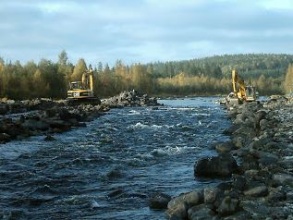Case study:Restoration of Kostonjoki River: Difference between revisions
No edit summary |
No edit summary |
||
| (4 intermediate revisions by 3 users not shown) | |||
| Line 1: | Line 1: | ||
{{Case study status | {{Case study status | ||
|Approval status= | |Approval status=Approved | ||
}} | }} | ||
{{Location | {{Location | ||
| Line 15: | Line 15: | ||
|Name of parent multi-site project=Case_study:Timber float restorations at River Iijoki | |Name of parent multi-site project=Case_study:Timber float restorations at River Iijoki | ||
|Multi-site=Yes | |Multi-site=Yes | ||
|Project picture=Kostonjoki.JPG | |||
|Project summary=Kostonjoki River is one of the tributaries of the River Iijoki. The River Kostonjoki was dredged for timber floating like many other tributaries of the River Iijoki. Before dredging in 1956-1958 there were 105 hectares of rapids and riffles in the Kostonjoki River. After dredging most of the riffles and rapids were destroyed and habitats of the migrating fish lost. Restorations of the Kostonjoki River took place in 2005-2012 as the aim of setting the condition of the water system closer to it´s natural state to enable the fish migration. Object of the restorations was to create pool-riffle variation, add natural water levels to rewater dried parts of the river and add stones and gravel to create habitats for migrating fish. Restorations were successful. Rapid and riffle areas of the Kostonjoki River grew 60% after restorations and densities of migrating fish increased. | |Project summary=Kostonjoki River is one of the tributaries of the River Iijoki. The River Kostonjoki was dredged for timber floating like many other tributaries of the River Iijoki. Before dredging in 1956-1958 there were 105 hectares of rapids and riffles in the Kostonjoki River. After dredging most of the riffles and rapids were destroyed and habitats of the migrating fish lost. Restorations of the Kostonjoki River took place in 2005-2012 as the aim of setting the condition of the water system closer to it´s natural state to enable the fish migration. Object of the restorations was to create pool-riffle variation, add natural water levels to rewater dried parts of the river and add stones and gravel to create habitats for migrating fish. Restorations were successful. Rapid and riffle areas of the Kostonjoki River grew 60% after restorations and densities of migrating fish increased. | ||
}} | }} | ||
{{Image gallery}} | |||
{{Case study image | |||
|File name=Restoration of Kostonjoki River Restoration (photo by Eero Moilanen).JPG | |||
|Caption=Restoration of Kostonjoki River (photo: Eero Moilanen) | |||
}} | |||
{{Case study image | |||
|File name=Restoration of Kostonjoki River Restoration of Ala-Susikoski torrent (photo by Eero Moilanen).jpg | |||
|Caption=Restoration of Kostonjoki River_Restoration of Ala-Susikoski torrent (photo: Eero Moilanen) | |||
}} | |||
{{Case study image | |||
|File name=Restoration of Kostonjoki River Restoration (photo by Eero Moilanen).JPG | |||
|Caption=Restoration of Kostonjoki River (photo: Eero Moilanen) | |||
}} | |||
{{Case study image | |||
|File name=Restoration of Kostonjoki River Restoration of Ala-Susikoski torrent (photo by Eero Moilanen).jpg | |||
|Caption=Restoration of Kostonjoki River_Restoration of Ala-Susikoski torrent (photo: Eero Moilanen) | |||
}} | |||
{{Image gallery end}} | |||
{{Toggle button}} | |||
{{Toggle content start}} | |||
{{Case study subcatchment}} | {{Case study subcatchment}} | ||
{{Site | {{Site | ||
| Line 39: | Line 61: | ||
{{Monitoring documents}} | {{Monitoring documents}} | ||
{{Monitoring documents end}} | {{Monitoring documents end}} | ||
{{Additional Documents}} | {{Additional Documents}} | ||
{{Additional Documents end}} | {{Additional Documents end}} | ||
| Line 66: | Line 66: | ||
{{Additional links and references footer}} | {{Additional links and references footer}} | ||
{{Supplementary Information}} | {{Supplementary Information}} | ||
{{Toggle content end}} | |||
Latest revision as of 14:31, 17 December 2013
Project overview
| Status | Complete |
|---|---|
| Project web site | |
| Themes | Economic aspects, Fisheries, Habitat and biodiversity, Social benefits |
| Country | Finland |
| Main contact forename | Jukka |
| Main contact surname | Tuohino |
| Main contact user ID | |
| Contact organisation | Centre for Economic Development, Transport and the Environment for North Ostrobothnia |
| Contact organisation web site | http://www.ymparisto.fi/default.asp?node=27306&lan=fi |
| Partner organisations | |
| This is a parent project encompassing the following projects |
Project summary
Kostonjoki River is one of the tributaries of the River Iijoki. The River Kostonjoki was dredged for timber floating like many other tributaries of the River Iijoki. Before dredging in 1956-1958 there were 105 hectares of rapids and riffles in the Kostonjoki River. After dredging most of the riffles and rapids were destroyed and habitats of the migrating fish lost. Restorations of the Kostonjoki River took place in 2005-2012 as the aim of setting the condition of the water system closer to it´s natural state to enable the fish migration. Object of the restorations was to create pool-riffle variation, add natural water levels to rewater dried parts of the river and add stones and gravel to create habitats for migrating fish. Restorations were successful. Rapid and riffle areas of the Kostonjoki River grew 60% after restorations and densities of migrating fish increased.
Monitoring surveys and results
Lessons learnt
Image gallery
|
Catchment and subcatchment
Site
Project background
Cost for project phases
Reasons for river restoration
Measures
MonitoringHydromorphological quality elements
Biological quality elements
Physico-chemical quality elements
Any other monitoring, e.g. social, economic
Monitoring documents
Additional documents and videos
Additional links and references
Supplementary InformationEdit Supplementary Information
| ||||||||||||||||||||||||||||||||||||||||||||||||||||||||||||||||||||||||||||||||||||||||||||||||||||||||||||||||||||||||||||||||||||||||||||||||||||||||||||||||||||||||||||||||||



